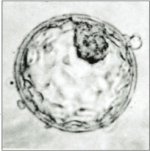RavenSky
The Doctor's Wife
Under the normal circumstances of birth, a female never has to give away any organs or parts of her body during the birth process.
The hormone relaxin also plays a role. As its name suggests, relaxin helps relax ligaments and bones in the pelvis, so the body can be elastic during childbirth. But relaxin also affects ligaments all over the body, including in the feet, which can make a woman's feet looser and more spread out, said Dr. Leena Nathan, an assistant clinical professor of obstetrics and gynecology at the University of California, Los Angeles.
New moms: Once your feet grow, you should get used to sporting a larger shoe size, as these changes are permanent, even after you lose weight and relaxin production stops, Cackovic said.
A 2008 study of 2,635 women in the American Journal of Public Health found that the more children women had, the more likely they were to have lost teeth. Women between the ages of 35 and 49 with one child had lost an average of two teeth, while women with two children lost an average of four. Meanwhile, women with four or more children had lost an average of seven teeth. It's not clear exactly why, as frequency of dental care didn't seem to be tied to this association.
Other dental problems include enlarged gums and more bleeding from gums during pregnancy because of increased blood flow, Nathan told Live Science. And the acid from vomiting, if women have morning sickness, can also wear away the enamel on teeth, Nathan said.
Gestational diabetes — that is, elevated blood sugar during pregnancy — develops in up to 10 percent of pregnancies in the United States. But the mother's diabetes risk doesn't end when the pregnancy does. After giving birth, up to half of the women who had gestational diabetes will develop type 2 diabetes later in life, Cackovic said.
One surprisingly common, and ultimately permanent, change associated with pregnancy is a condition called diastasis recti abdominis. It's when the abdominal muscles separate, creating a gap between the stomach muscles.
All women will have this separation at the late stages of pregnancy to make room for the growing belly. But by a year postpartum, somewhere between a third to more than two-thirds of women will retain some separation between their abdominal muscles, various studies suggest.
https://www.livescience.com/63291-post-pregnancy-changes.html
Skin: A woman's face, areolas, stomach and moles often darken during pregnancy, and might stay that way. An increase in estrogen is usually to blame. Butler Tobah said an easy way of telling if a woman has had a baby is to check her belly for a pregnancy line (linea nigra), which usually fades after pregnancy but might never really go away. The same goes for darkening of the central part of the face, often known as the mask of pregnancy. Stretch marks, scars from skin tears as skin expands, can also fade but might not go away.
Thyroid hormones, which help regulate body temperature, metabolism and organ function, can be affected by giving birth, too. According to the American Thyroid Association, five to 10 percent of women have postpartum thyroiditis, an inflammation of the thyroid gland, and the exact cause isn’t known. Symptoms can include insomnia, anxiety, rapid heart rate, fatigue, weight loss and irritability (one to four months after birth) or fatigue, weight gain, constipation, dry skin and depression (four to eight months after birth).
and so on....
No... no losses to a woman's body from a pregnancy.

 You just tipped your hand Half-Wit
You just tipped your hand Half-Wit 